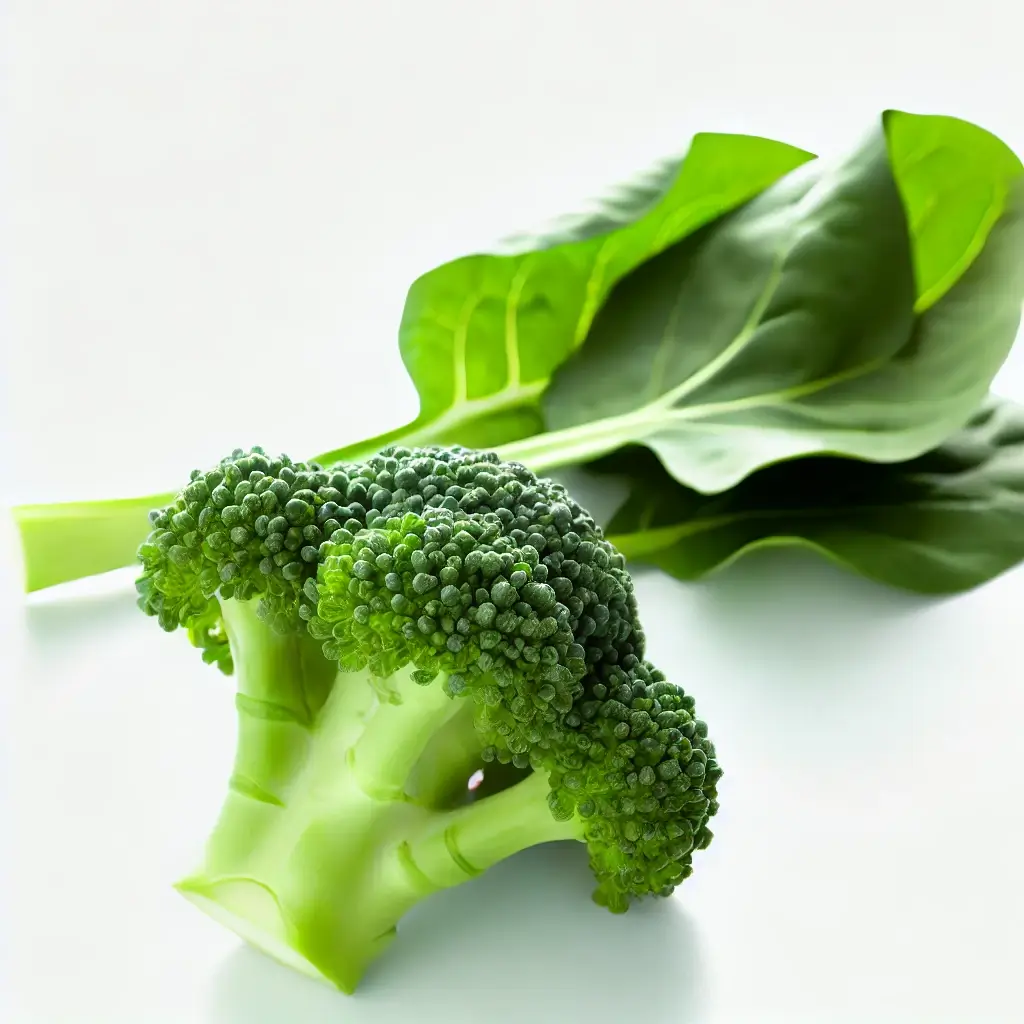Why Broccoli Deserves Superfood Status: A Deep Dive into Its Benefits

Broccoli, a green vegetable belonging to the cruciferous family, is widely celebrated for its rich nutritional profile and numerous health benefits. Originating from the Mediterranean, broccoli has been a dietary staple for centuries, known not only for its versatility in the kitchen but also for its potential to boost overall health. Whether you enjoy it steamed, roasted, or raw, broccoli is often hailed as a superfood—a term reserved for nutrient-dense foods that offer significant health benefits. In this article, we’ll explore why broccoli is considered a superfood, delve into its health advantages, and discuss how to incorporate it into your daily diet.
Health Benefits of Broccoli
1. Rich Source of Antioxidants
Broccoli is packed with antioxidants, compounds that help protect the body from oxidative stress and chronic diseases.
- High in Vitamin C: Broccoli is an excellent source of vitamin C, a powerful antioxidant that supports immune function, skin health, and wound healing. Vitamin C also helps neutralize free radicals, preventing cellular damage that can lead to chronic diseases.
- Contains Sulforaphane: Sulforaphane is a sulfur-containing compound found in broccoli that has been shown to reduce oxidative stress and inflammation. It activates the body’s natural detoxification enzymes, helping to protect against environmental toxins and carcinogens.
- Other Antioxidants: Broccoli also contains other antioxidants such as beta-carotene, lutein, and zeaxanthin, which support eye health and reduce the risk of age-related macular degeneration.
2. Supports Heart Health
The nutrients in broccoli contribute to cardiovascular health by reducing risk factors associated with heart disease.
- Lowers Cholesterol: Broccoli contains soluble fiber, which helps lower LDL (bad) cholesterol levels by binding to bile acids in the gut and promoting their excretion. This process helps reduce the amount of cholesterol in the bloodstream.
- Regulates Blood Pressure: The potassium in broccoli helps regulate blood pressure by balancing sodium levels and promoting vasodilation, the relaxation of blood vessels. This reduces the risk of hypertension and stroke.
- Anti-Inflammatory Effects: Chronic inflammation is a key driver of heart disease. The anti-inflammatory properties of broccoli, particularly due to its sulforaphane content, help protect the cardiovascular system from inflammation-related damage.
3. Boosts Immune Function
Broccoli is a nutritional powerhouse that supports a healthy immune system, helping the body fend off infections and diseases.
- Rich in Vitamin C: Vitamin C is essential for a robust immune system. It stimulates the production of white blood cells, which are crucial for fighting infections. Broccoli’s high vitamin C content makes it an excellent food for boosting immunity.
- Contains Zinc and Selenium: These trace minerals are vital for maintaining a strong immune response. Zinc supports the development and function of immune cells, while selenium acts as an antioxidant, protecting cells from damage.
- Promotes Gut Health: A healthy gut is closely linked to a strong immune system. The fiber in broccoli supports a healthy gut microbiome, which plays a crucial role in immune function.
4. Supports Digestive Health
The high fiber content in broccoli makes it an excellent food for supporting digestive health and preventing various digestive disorders.
- Rich in Dietary Fiber: Broccoli is high in both soluble and insoluble fiber, which aids in digestion by promoting regular bowel movements and preventing constipation. Fiber also feeds the beneficial bacteria in the gut, supporting a healthy gut microbiome.
- Prevents Digestive Disorders: Regular consumption of broccoli can help prevent digestive disorders such as irritable bowel syndrome (IBS) and diverticulitis. Its anti-inflammatory properties also soothe the digestive tract and reduce the risk of inflammation-related conditions.
- Detoxifies the Gut: The sulforaphane in broccoli supports the body’s detoxification processes by activating enzymes that remove toxins from the digestive system. This helps protect the gut from damage caused by environmental toxins and carcinogens.
5. Promotes Bone Health
Broccoli is rich in nutrients that are essential for maintaining strong, healthy bones.
- High in Calcium: Broccoli is a good source of calcium, a mineral that is essential for bone health. Calcium is necessary for the formation and maintenance of strong bones and teeth, and adequate intake is crucial for preventing osteoporosis.
- Rich in Vitamin K: Vitamin K plays a vital role in bone metabolism by helping to regulate calcium deposition in bones. A deficiency in vitamin K can lead to bone loss and an increased risk of fractures.
- Contains Magnesium and Phosphorus: These minerals work together with calcium to maintain bone density and strength. Magnesium is also important for the proper function of enzymes involved in bone formation.
6. Supports Eye Health
The antioxidants in broccoli, particularly lutein and zeaxanthin, contribute to eye health and protect against age-related eye disorders.
- Prevents Macular Degeneration: Lutein and zeaxanthin are carotenoids that accumulate in the retina, where they protect against damage from blue light and oxidative stress. This reduces the risk of age-related macular degeneration, a leading cause of vision loss in older adults.
- Protects Against Cataracts: The vitamin C and beta-carotene in broccoli also help protect the eyes from oxidative damage, reducing the risk of cataracts, which is a clouding of the eye’s lens that can lead to blindness.
- Supports Overall Eye Health: Regular consumption of broccoli provides a range of nutrients that support overall eye health, helping to maintain clear vision and prevent common eye disorders.
7. Aids in Weight Management
Broccoli is a low-calorie, nutrient-dense food that can aid in weight management by promoting satiety and reducing calorie intake.
- Low in Calories: Broccoli is low in calories, making it an excellent choice for those looking to manage their weight. A cup of cooked broccoli contains only about 55 calories, while providing a wealth of nutrients.
- High in Fiber: The fiber content in broccoli helps you feel full longer, reducing the likelihood of overeating and aiding in portion control. Fiber also stabilizes blood sugar levels, which can help prevent cravings for unhealthy snacks.
- Supports Metabolism: The nutrients in broccoli, particularly vitamin C, calcium, and chromium, support a healthy metabolism. A healthy metabolism is crucial for burning calories efficiently and maintaining a healthy weight.
How to Incorporate Broccoli into Your Daily Diet
Broccoli is a versatile vegetable that can be easily incorporated into a variety of dishes. Here are some practical ways to include broccoli in your daily diet:
- Steamed Broccoli: Steaming is one of the best ways to preserve the nutrients in broccoli. Simply steam broccoli florets for about 5-7 minutes and enjoy as a side dish or add to salads and grain bowls.
- Broccoli Stir-Fry: Stir-frying broccoli with garlic, ginger, and soy sauce makes for a delicious and nutrient-packed dish. Add other vegetables, tofu, or lean protein for a complete meal.
- Broccoli Soup: Puree cooked broccoli with vegetable broth, onions, and garlic to create a creamy, comforting soup. Add a splash of cream or coconut milk for extra richness.
- Raw Broccoli: Add raw broccoli florets to salads or enjoy them with hummus or a yogurt-based dip for a crunchy, healthy snack.
- Broccoli Rice: Pulse broccoli florets in a food processor until they resemble rice grains. Use as a low-carb substitute for rice in stir-fries, grain bowls, or as a side dish.
- Broccoli Smoothie: Add a handful of raw or steamed broccoli to your morning smoothie for an extra boost of nutrients. Pair with fruits like banana and mango to balance the flavor.
- Roasted Broccoli: Toss broccoli florets with olive oil, salt, and pepper, and roast in the oven at 400°F (200°C) for 20-25 minutes until crispy and caramelized. Serve as a side dish or toss with pasta and parmesan cheese.
Potential Disadvantages of Broccoli
While broccoli offers numerous health benefits, there are a few potential drawbacks to consider:
- Digestive Issues: In some individuals, consuming large amounts of broccoli can cause digestive discomfort, including gas, bloating, and cramping. This is due to its high fiber content and the presence of raffinose, a complex sugar that can be difficult to digest.
- Interference with Thyroid Function: Broccoli contains goitrogens, substances that can interfere with thyroid function by inhibiting the uptake of iodine. This may be a concern for individuals with thyroid disorders, especially if consumed in large quantities. Cooking broccoli can reduce its goitrogenic effects.
- Possible Allergies: Although rare, some people may be allergic to broccoli. Symptoms of a broccoli allergy can include itching, swelling, and digestive discomfort. If you experience these symptoms, discontinue use and seek medical attention.
Nutritional Values of Broccoli
| Nutrient | Amount per 100g | % Daily Value |
|---|---|---|
| Calories | 34 kcal | 2% |
| Carbohydrates | 6.6 g | 2% |
| Protein | 2.8 g | 6% |
| Fat | 0.4 g | 1% |
| Dietary Fiber | 2.6 g | 10% |
| Vitamin C | 89.2 mg | 149% |
| Vitamin K | 101.6 µg | 127% |
| Vitamin A | 623 IU | 12% |
| Folate | 63 µg | 16% |
| Potassium | 316 mg | 9% |
| Calcium | 47 mg | 5% |
| Iron | 0.7 mg | 4% |
| Magnesium | 21 mg | 5% |
Conclusion
Broccoli truly earns its status as a superfood due to its impressive array of health benefits. From supporting heart health and boosting immune function to promoting bone health and aiding in weight management, broccoli is a nutrient-dense vegetable that can have a profound impact on overall health. Its versatility in the kitchen makes it easy to incorporate into your daily diet, whether you prefer it steamed, roasted, or raw. While there are a few potential drawbacks, such as digestive discomfort or interference with thyroid function, these are generally outweighed by the numerous benefits broccoli offers.
Including broccoli as a regular part of your diet is a simple and delicious way to boost your nutrient intake and support your long-term health.
*Disclaimer: The information provided in this article is for educational and informational purposes only and should not be construed as health advice. The content is solely the personal opinion of the author and is not intended to be a substitute for professional medical advice, diagnosis, or treatment. Always seek the advice of your physician or other qualified health provider with any questions you may have regarding a medical condition or before starting any new diet or treatment. Read more



Post Comment